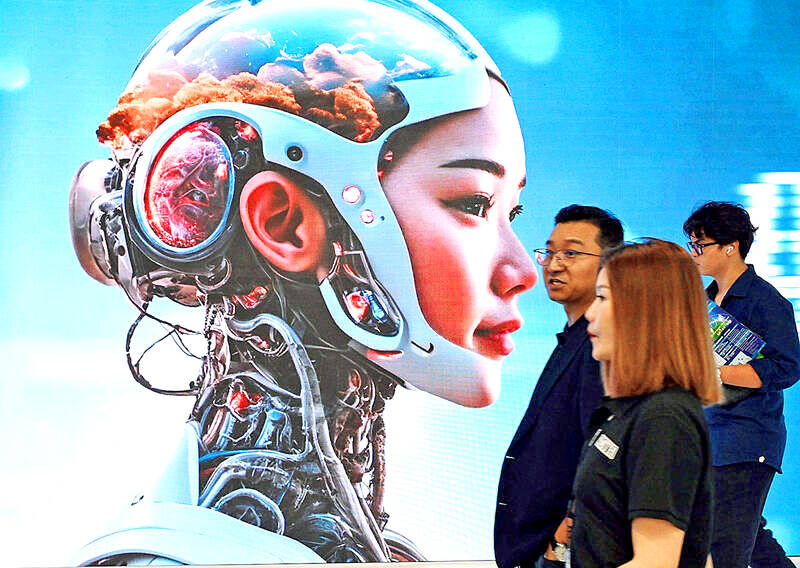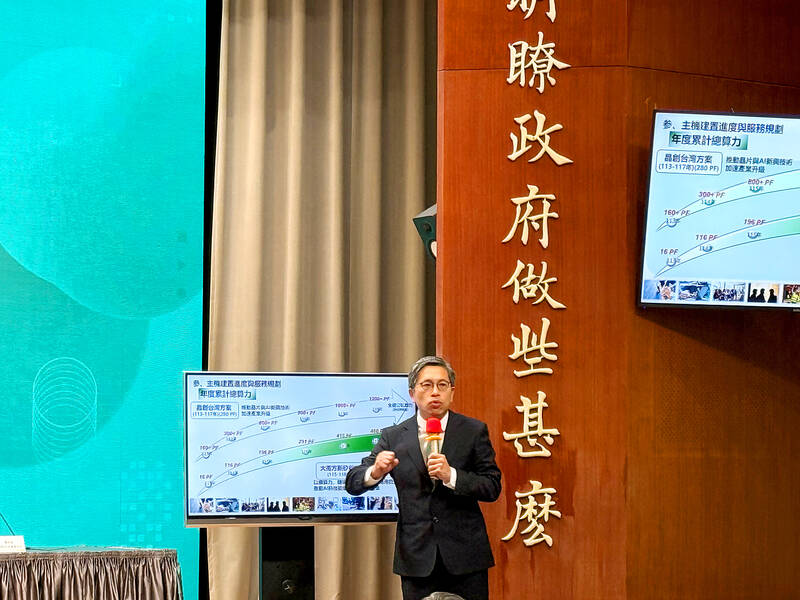The government would intensify efforts to bolster its “Sovereign Artificial Intelligence [AI]” program by setting a goal of elevating the nation’s collective computing power in the public and private sectors to 1,200 peta floating points per second (petaflops) by 2029, the Executive Yuan said yesterday.
The goal was set to fulfill President William Lai’s (賴清德) vision of turning Taiwan into an “AI island.”
Sovereign AI refers to a nation’s capabilities to produce AI using its own infrastructure, data, workforce and business networks. One petaflop allows 1 trillion calculations per second.

Photo: Chang Chia-ming, Taipei Times
As of Nov. 19 last year, Taiwan was globally ranked No. 11 for having computing power of 103 petaflops, according to the Top500 project, which ranks and details the 500 most powerful non-distributed computer systems in the world, the National Science and Technology Council (NSTC) said yesterday at a news conference after the weekly Cabinet meeting.
The US tops the list with 6,475 petaflops, followed by Japan, Italy, Switzerland, Germany, Finland, China, France, Spain and South Korea.
National Applied Research Laboratories president Tsai Hung-yin (蔡宏營) said the government has planned to upgrade the supercomputer’s power and energy use efficiency through the Taiwan Chip-based Industrial Innovation Program and Big South New Silicon Valley Project, with the goal of reaching 480 petaflops in the public sector by 2029.

Photo: Chung Li-hua, Taipei Times
In the same year, the accumulative computing power would top 1,200 petaflops when efforts from the private sector are added, Tsai said.
The nation’s AI supercomputer is to begin operations in May, he added.
The government is planning to build a large cloud data center to accommodate servers for supercomputers and large data storage facilities, the council said.
The cloud data center in the Southern Taiwan Science Park (南部科學園區) is scheduled to open at the end of this year, while the AI computing data center in Tainan’s Shalun (沙崙) area is to open by 2029, the council said.
NSTC Deputy Minister Lin Faa-jeng (林法正) said that the draft of the AI basic act has yet to be delivered to the Legislative Yuan for deliberations as the Executive Yuan is still reviewing it.
Meanwhile, the Executive Yuan yesterday also unveiled the management guidelines governing the use of generative AI among government agencies, after imposing a comprehensive ban on government agencies using China-developed AI software DeepSeek last week.
The government has three main measures to regulate the use of generative AI systems among government agencies, including establishing an AI Evaluation Center (AIEC), setting out an AI application manual and composing user guidelines for cybersecurity products that could compromise national security, the Ministry of Digital Affairs (MODA) said.
Taiwan’s AIEC, which was established in December 2023, leads the development of methods to evaluate AI applications by referencing similar ones abroad and building an AI evaluation lab and certification institution, the ministry said, adding that the government and AI users in the private sector have submitted AI applications for evaluation.
The Principles on Limiting Harmful Products Against Cybersecurity Used by Government Agencies (各機關對危害國家資通安全產品限制使用原則) stipulates that a government agency that uses products that could risk compromising cybersecurity, disrupt the operations of the government or destabilize society should list reasons for doing so and secure the approvals from the agency’s chief cybersecurity official, cybersecurity officials of higher authorities and the MODA, the ministry said.
The government should also make a list of similar products that are in use, it added.
The agency must require such products to be used in specific areas and by specific individuals, the ministry said, adding that the use of such products must be discontinued immediately if reasons for using them no longer exist.
These products must be plugged to computers that do not contain personal or other sensitive data and are not connected to the Internet, the ministry said.
If public universities or research institutions in Taiwan need to use DeepSeek for research, they need to apply for approval in accordance with regulations and take necessary control measures before using it, the ministry said.

CRITICAL MOVE: TSMC’s plan to invest another US$100 billion in US chipmaking would boost Taiwan’s competitive edge in the global market, the premier said The government would ensure that the most advanced chipmaking technology stays in Taiwan while assisting Taiwan Semiconductor Manufacturing Co (TSMC, 台積電) in investing overseas, the Presidential Office said yesterday. The statement follows a joint announcement by the world’s largest contract chipmaker and US President Donald Trump on Monday that TSMC would invest an additional US$100 billion over the next four years to expand its semiconductor manufacturing operations in the US, which would include construction of three new chip fabrication plants, two advanced packaging facilities, and a research and development center. The government knew about the deal in advance and would assist, Presidential

‘DANGEROUS GAME’: Legislative Yuan budget cuts have already become a point of discussion for Democrats and Republicans in Washington, Elbridge Colby said Taiwan’s fall to China “would be a disaster for American interests” and Taipei must raise defense spending to deter Beijing, US President Donald Trump’s pick to lead Pentagon policy, Elbridge Colby, said on Tuesday during his US Senate confirmation hearing. The nominee for US undersecretary of defense for policy told the Armed Services Committee that Washington needs to motivate Taiwan to avoid a conflict with China and that he is “profoundly disturbed” about its perceived reluctance to raise defense spending closer to 10 percent of GDP. Colby, a China hawk who also served in the Pentagon in Trump’s first team,

SEPARATE: The MAC rebutted Beijing’s claim that Taiwan is China’s province, asserting that UN Resolution 2758 neither mentions Taiwan nor grants the PRC authority over it The “status quo” of democratic Taiwan and autocratic China not belonging to each other has long been recognized by the international community, the Mainland Affairs Council (MAC) said yesterday in its rebuttal of Beijing’s claim that Taiwan can only be represented in the UN as “Taiwan, Province of China.” Chinese Minister of Foreign Affairs Wang Yi (王毅) yesterday at a news conference of the third session at the 14th National People’s Congress said that Taiwan can only be referred to as “Taiwan, Province of China” at the UN. Taiwan is an inseparable part of Chinese territory, which is not only history but

INVESTMENT WATCH: The US activity would not affect the firm’s investment in Taiwan, where 11 production lines would likely be completed this year, C.C. Wei said Investments by Taiwan Semiconductor Manufacturing Co (TSMC, 台積電) in the US should not be a cause for concern, but rather seen as the moment that the company and Taiwan stepped into the global spotlight, President William Lai (賴清德) told a news conference at the Presidential Office in Taipei yesterday alongside TSMC chairman and chief executive officer C.C. Wei (魏哲家). Wei and US President Donald Trump in Washington on Monday announced plans to invest US$100 billion in the US to build three advanced foundries, two packaging plants, and a research and development center, after Trump threatened to slap tariffs on chips made